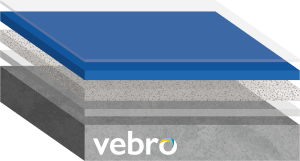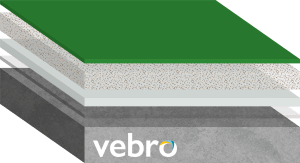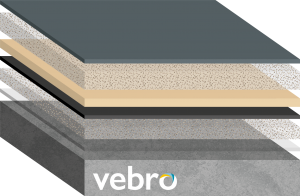
vebrodeck ID BL
vebrodeck ID BL is a hybrid car park deck coating system designed for basement parking decks of multi-storey parking structures.
Home > Multi-Storey Car Parks
Wearing surfaces in multi-storey car parks can present a wide range of challenges. Movement from heavy vehicles, exposure to corrosive automotive oils and exposure to the elements on semi-exposed decks can all quickly deteriorate the structure if not adequately protected against.
Intermediate decks are subject to repeated loading, unloading and non-stop structural movement. In addition to the physical stresses, intermediate decks experience exposure to water, chemical contaminants, dirt, and high concentrations of exhaust gasses – all of which are contributing factors that can lead to surface degradation.
Basement level decks on the other hand experience very little or no exposure to sunlight and are not subject to the same flexing or thermal cycling as intermediate and exposed decks. Because of contact with the ground, these levels are much more likely to experience rising moisture, which can lead to severe difficulties for any wearing surface used as a protective coating.
Dampness in concrete screeds can quickly lead to floor failure. Because the lowest basement is often below the level of the water table, this has a very high risk of failure, and so a flooring system with rising moisture tolerance must be specified.
Selecting a deck wearing surface that can protect against the risk of surface degradation on all decks is therefore a must-have for car park owners and operators in order to maintain the structure’s appearance, safety and overall quality.
Multi-storey car parks comprise of large clear spans with few supporting columns. As a result, when supporting sustained traffic, the structure becomes susceptible to movement and flexing. The continuous vibrations caused by the traffic puts the entire structure at risk of dynamic loading where vibrations travel throughout the joints and frames of the structure and the decks.
To counter-act this, flexible, crack-bridging wearing surfaces are recommended allowing the deck membrane to ‘move’ with the structure, eliminating the risk of cracks and potholes appearing within the deck.
Vebro Polymers offer a number of seamless polyurethane and MMA resin wearing surfaces designed for installation on exposed, intermediate and lower basement decks of multi-storey parking structures – all of which offer individual benefits including flexibility, slip and chemical resistance, moisture mitigation and speed of cure.
The vebrodeck range offers a solution for all exposed, intermediate and lower basement deck challenges. However, as every deck is different, Vebro recommends a full consultation and site evaluation takes place with one of our technical reps to ensure a custom-built deck solution tailored for your specific requirements.

vebrodeck ID BL is a hybrid car park deck coating system designed for basement parking decks of multi-storey parking structures.

vebrodeck PU ID is a polyurethan-based car park deck coating system designed for interior parking decks of multi-storey parking decks.

vebrodeck EP ID is an epoxy-based car park deck coating system designed for interior parking decks of multi-storey parking decks.

vebrodeck ID BL is a vapour permeable, water-emulsified, OS8 certified, epoxy resin decking system designed for use on intermediate or basement level decks of multi-storey or underground parking structures subject to hydrostatic pressures from the surrounding water table.

vebrodeck ID is a durable, economical, hybrid resin deck wearing system, designed for use on driveways and parking bays of internal or basement level decks of multi-storey parking structures.

vebrodeck ID OOP is an OS11a certified, hybrid resin car park decking system with enhanced dynamic crack bridging properties (Class B3.2).

vebrodeck Vitesse is a fast–cure polyurea deck wearing system with dynamic crack bridging capabilities (Class B4.2 -20°C)) up to 0.8 mm designed for use on top decks of multi–storey parking structures.

vebrodeck MMA ED is a fast-cure, methyl-methacrylate deck wearing system with dynamic crack bridging capabilities (Class B3.2) between
0.3 – 0.6 mm designed for use on top decks of multi-storey parking structures.

vebrodeck MMA ID is a fast–cure, OS8 certified, methyl-methacrylate decking system designed for use on driveways and parking bays of intermediate level decks of multi-storey parking structures.

vebrodeck PU Linemarker is a pigmented, roller applied linemarker for use in conjunction with vebrodeck systems.

vebrodeck MMA Linemarker is a pigmented, roller applied linemarker for use in conjunction with vebrodeck MMA systems.
| Title | Solutions | Applications | Download |
|---|---|---|---|
| vebrodeck EP ID | vebrodeck | Multi-Storey Car Parks | |
| vebrodeck ID | vebrodeck | Multi-Storey Car Parks | |
| vebrodeck ID BL | vebrodeck | Multi-Storey Car Parks | |
| vebrodeck ID BL (Basement Level) | vebrodeck | Multi-Storey Car Parks | |
| vebrodeck ID OOP (Over Occupied Premises) | vebrodeck | Multi-Storey Car Parks | |
| vebrodeck MMA ED | vebrodeck | Multi-Storey Car Parks | |
| vebrodeck MMA ID | vebrodeck | Multi-Storey Car Parks | |
| vebrodeck MMA Linemarker | vebrodeck | Multi-Storey Car Parks | |
| vebrodeck PU ID | vebrodeck | Multi-Storey Car Parks | |
| vebrodeck PU Linemarker | vebrodeck | Multi-Storey Car Parks | |
| vebrodeck Vitesse | vebrodeck | Multi-Storey Car Parks | |
| vebrores EP Mortar | vebrores | Multi-Storey Car Parks, Commercial Venues, Industrial & Manufacturing |
Resin flooring can sometimes be more expensive in the short term than using other materials, this can be as a result of a potential increased cost of materials as well as the outlay for specialist trained resin contractors to install the product, but its durability alone makes it an extremely cost-effective option, as you won’t need to replace it for many years.
And, when you take into account other savings that you can generate as a result of selecting resin flooring, such as reduced maintenance, cleaning and energy costs, it makes sense that an investment now will continue to pay dividends in the long term too!
Slips and trips are one of the most common accidents that occur in the workplace, and one of the reasons for this can be unsuitable floor coverings. With a staff body to protect, it is important to consider this when choosing a floor finish, as well as the service criteria that a floor will be subject to.
For example, areas subject to either wet processes, frequent spillages or those that employ rigorous cleaning regimes such as steam cleaning or hot water wash downs should take particular care to ensure an anti-slip finish when replacing floor coverings or coatings.
Liquid-applied resin floor systems are great to custom build any safety features that you require from your floor within your workspace, surface profiles can be tailored to include quartz, aluminium oxide, glass spheres or silicon carbide in order to enhance the slip resistance profile of the floor finish.
Resins are seamless in nature and don’t include joints or grout lines, which are susceptible to harbouring dirt, grease, bacteria and stains in general. Dust and dirt can simply be swept, mopped or hoovered away and the floor cleaned according to manufacturer’s guidelines based on the surface profile of the floor.
Resin flooring is also extremely strong and durable, meaning that it has an extended service life compared to other floor coverings. Installed properly, and with the correct maintenance, it can last for years without cracking or peeling, meaning that you won’t have to replace the floor or carry out repairs as frequently than you would if using other materials.
Epoxy, polyurethane, MMA and polyurethane concrete all exhibit good resistance to a range of chemicals associated with cleaning agents or foodstuffs.
For more aggressive chemicals or food & beverages ingredients such as hydrochloric acid, sugars, oils, blood and detergents, heavy-duty polyurethane concrete provides a resistant surface underfoot.
That said, not all chemicals are created equal, so it’s important to check that your choice of flooring material will be suitable for the specific chemicals found in your processes or facility.
The chemical resistance of flooring materials largely depends on a number of specific factors, including the type of chemical, its concentration, and the temperature and degree of surface contact time.
Polyurethane Concrete
Generally speaking, polyurethane concrete systems such as vebrocrete offer a good degree of chemical resistance to a wide range or acids, alkalis, and solvents. For low to medium concentrations of organic acids such as hydrochloric, acetic, lactic and formic, polyurethane systems demonstrate excellent chemical resistance.
However, some stronger concentrations of these types of acid can cause some surface staining, usually without loss of physical strength properties even at elevated temperatures over prolonged surface contact.
Additionally, polyurethane concrete systems offer excellent chemical resistance to solvents and alkalis at low, medium and high strength concentrations at prolonged periods of contact and temperatures with minimal surface staining and loss of physical strength properties.
Methyl-methacrylate
For chemical resistance to high strength organic acids, even with prolonged exposure, methyl-methacrylate (MMA) chemistries such a vebrospeed offer superior resistance against surface staining without loss of physical strength properties. Additionally, MMA systems offer good chemical resistance to a variety of alkalis at various strength and concentrations. However MMA systems are generally not suited to solvents and should be avoided in facilities where solvents will be present.
Epoxy
Epoxy systems, such as various systems in the vebrores range, are generally suited to weak to medium strength acids including organic and inorganic acids like boric and phosphoric, but are not suited to high concentration organic and inorganic acids. Epoxy systems generally offer good chemical resistance to a variety of alkalis at various concentrations, but are more susceptible to attack from medium strength acids at elevated temperatures. Epoxy systems have limited chemical resistance to solvents dependant upon solvent type, temperature and duration of exposure.
The team at Vebro HQ would love to discuss your upcoming project and would be happy to talk performance characteristics and specs along with any specific functional needs you may have to ensure that you get a tailor-made flooring system that has been custom built to your individual requirements.
For the latest news, info and updates from Vebro Polymers…
Vebro Polymers has launched its brand new range of sports flooring systems, vebrosport CourtFloor Plus and vebrosport CourtFloor Eco, to the UK and European market. Developed by Vebro’s
Read MoreAs Vebro continues to enjoy significant growth from its headquarters in Manchester, UK and Kuala Lumpur, Malaysia, it is with great pleasure that we welcome Lisa Coulthurst to
Read MoreAesthetics can often be overlooked in industrial facilities, where functionality typically takes significant precedence over form. Heavy-duty, punishing processes in industrial environments, such as factories, warehouses, electronics processing
Read MoreVebro Polymers has manufacturing and office headquarters in Manchester, UK and Kuala Lumpur, Malaysia, as well as a number of distribution partners. Please choose your nearest Vebro HQ or distribution location to see local content.